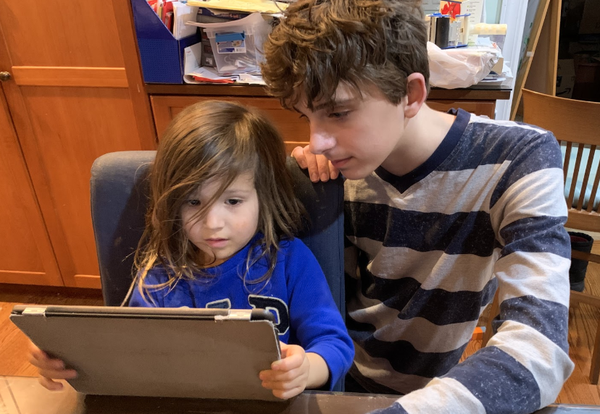[ 458 words ]
“How do you get past the profit motive?” a business consultant asked me. The consultant wanted to know how to engage business leaders in social responsibility.
My first answer was true: “Well-planned social responsibility enhances profit. There’s no conflict.” However, that answer was incomplete; people often miss socially responsible business opportunities because they look different than ‘normal’ business chances.
And how do you coach someone to identify such chances? I learn about coaching from my sons:
The “I can’t do it!” ringing through the halls of our house brought my family running. My four-year old son, Reuben, was red-faced with the iPad poised to be launched across the room.
Reuben’s teenage brother, Devin, sighed, and walked over to look at the math problem on the digital technology. Devin’s eyes bugged. “Dad, you’re kidding me. Reuben doesn’t know how to multiply three times two, yet he’s trying a complex algebra problem?!?! How am I supposed to help with that??”
But Devin tried. “Reuben, you’re solving for ‘Y’. What if you tried this first step?” and Devin touched a button that moved an algebra term.” Reuben’s eyes lit up. “OOHHH!” Reuben followed up by asking Devin a couple questions to clarify, and then took over, rapidly gathering terms, factoring, and adjusting denominators.
By the time the answer appeared, “Y = 2X / 3AB,” Devin was impressed. “Reuben doesn’t think about math the way I do, but he’s good!”
Devin had underestimated Reuben and misunderstood the challenge. Algebra is a symbolic logic that you can apply (at least on the computer) without memorizing multiplication tables. By sharing the goal and helping get started, Devin had provided enough support. And the result was a beaming Reuben, who solved the problem his way, using his own approach.

So, what’s the equivalent for helping businesspeople deliver greater value for both investors and society?
- Clarify the goal: to create value for society, that is shared by business.
Conservative estimates of the value destroyed by many social problems exceed a billion, and often a trillion, dollars. Which are billions of reasons for business to innovate and deliver solutions. For example, a college-educated African American is less likely to own their own home than is a caucasian with only a high school diploma– suggesting there are millions of potential homeowners capable of buying today. And such challenges, with corresponding opportunities, surround us.
- Help uncover a first, concrete tool that delivers a win for both investors and society.
Insight may be directly under your nose, but if that potential is different than you’ve recognized before, someone else may have to point it out the first time.
- Ensure there’s a strategy and trust that execution will occur.
Most people, including businesspeople, want to do good. And when shown how that good can also help that person do well, they jump on it. While people in each industry view the world uniquely— we all share our humanity.
In short, the key to getting ‘past the profit motive’ is helping a businessperson recognize that good business and doing good can be the same thing. Have you ever made a mistake by not trusting someone enough? Perhaps you used a heavy hand when a light touch would have been more effective?
Please share your thoughts in the comments or by sending me an email: info@RodWallacePhD.Com.
Our society cannot just survive. For the sake of our children, it must thrive.
Rod
Dr. Rod Wallace is an economist, consultant, and speaker who helps businesses make more money by solving society’s problems. A Fulbright Fellow, he has led multi-organization billion-dollar initiatives worldwide and partnered with a Silicon Valley pioneer to explore the impact of Artificial Intelligence on society.
Rod speaks about how to integrate social responsibility into business to maximize profit and purpose. He highlights digital technology’s impact on society and the strategies and tools with which business can solve our big, systemic problems.
Contact Rod at info@RodWallacePhD.com.
